'Jeopardy!' Contestant Creates Buzz with Psychological Study of Trivia Experts
Emory scientist competes in 'Jeopardy!' Invitational Tournament
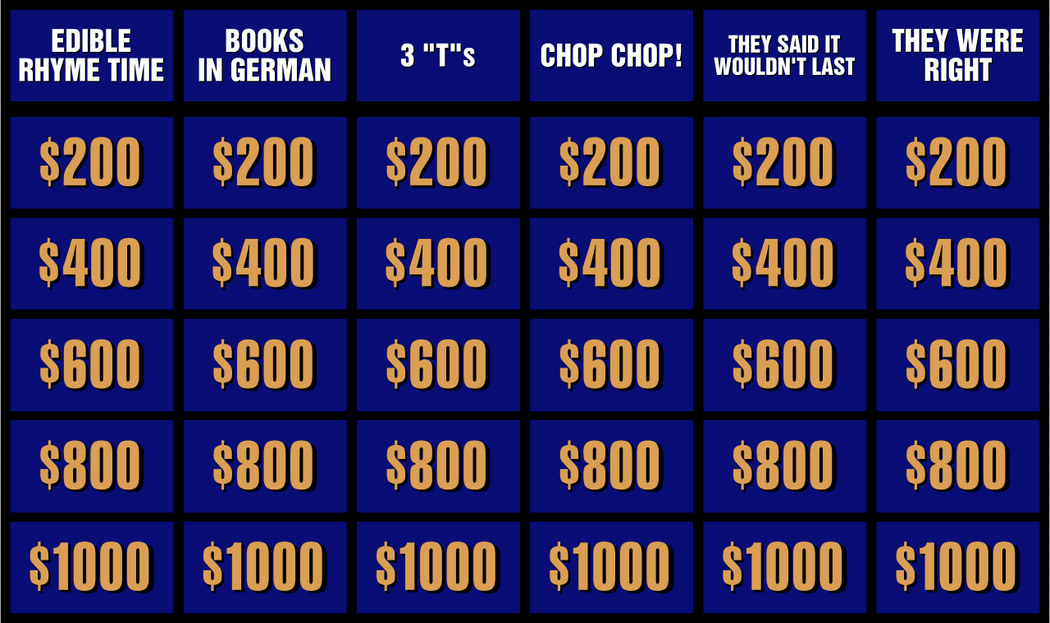
These three first dynasties of China marked the beginning of its civilization.
Monica Thieu hears that sentence and her mind travels back to an eighth-grade geography lesson. Her memory instantly pulls up the dynasty names: The Xia, the Shang and the Zhou.
“In my mind’s eye I can see the cover of the textbook where I learned these facts,” Thieu says. “It had a maroon bar over the top of the title and a gold-colored map of the world.”
Thieu is a four-time “Jeopardy!” contestant. She is also an Emory FIRST (Fellowships in Research and Science Teaching) Postdoctoral Fellow in the Department of Psychology.

Double Jeopardy: A trivia expert herself, Monica Thieu recently published a study revealing a mechanism that may explain why some people perform at an extremely high level in trivia games.
Double Jeopardy: A trivia expert herself, Monica Thieu recently published a study revealing a mechanism that may explain why some people perform at an extremely high level in trivia games.
Thieu placed second in her latest "Jeopardy!" appearance on March 28, in a match during the quarter-finals of the first-ever "Jeopardy!" Invitational Tournament.
When “Jeopardy!” host Ken Jennings asked Thieu to tell a fun fact about herself, viewers learned: Thieu and colleagues from Columbia University delved into how the minds of trivia experts work. Their study is the first to reveal a mechanism involved in the mystery of why trivia experts may have stellar recall for facts while not always having superior memories in general.
Psychonomic Bulletin & Review recently published their findings that two memory systems — one for facts and another for personal experiences — are more entwined in the minds of top trivia experts compared to others.
“In trivia experts, it appears that these two systems are talking to each other in unique ways,” Thieu says. “Our findings for this special population may help us better understand how memory works in normative populations.”
Thieu says her personal experience in trivia competitions helped in the design of the study.
“It’s tricky to make sure that lab experiments are both rigorous and reflect lived experience,” Thieu says. “I know the world of trivia experts well.”
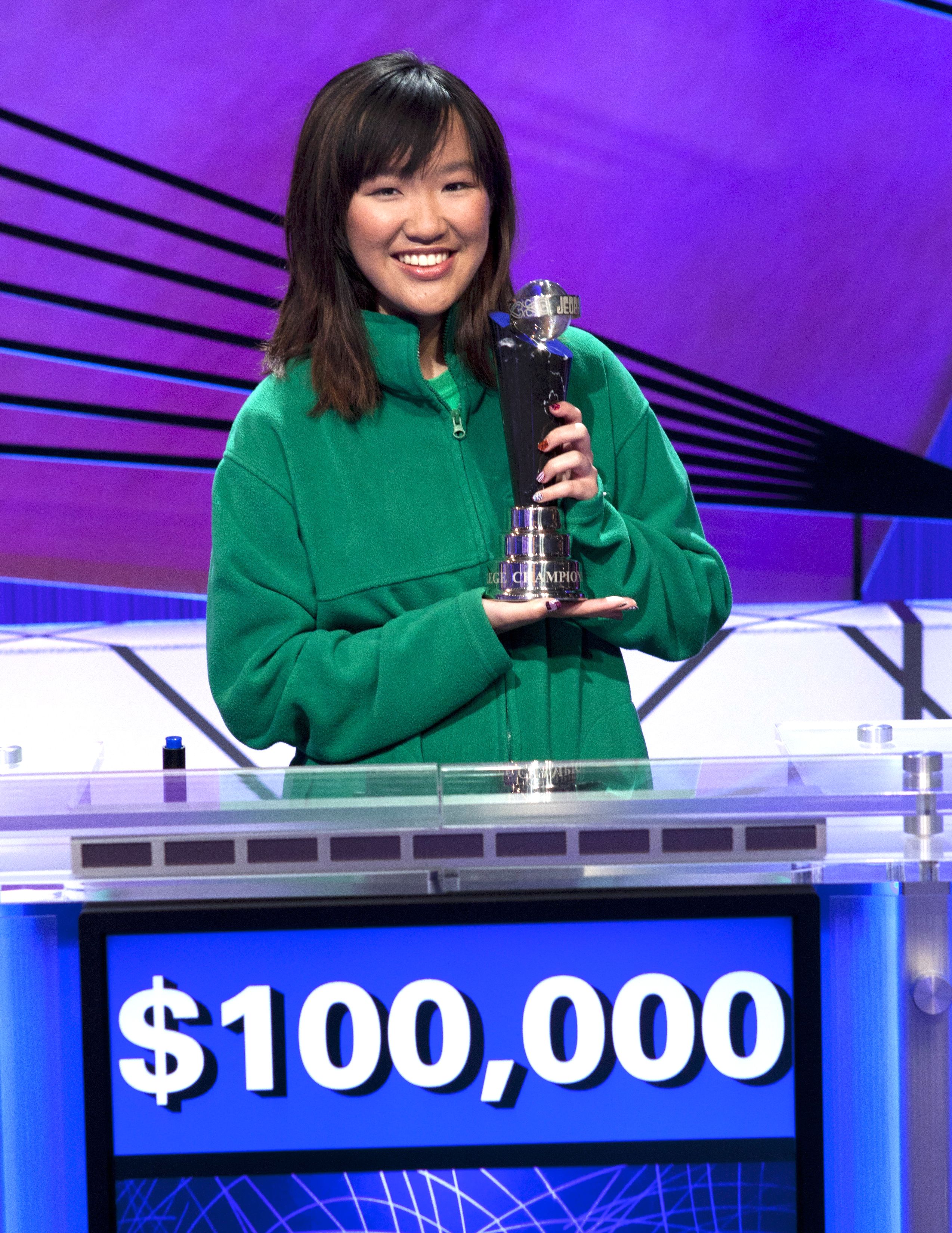
Monica Thieu in 2012, when she won the "Jeopardy!" College Championship. (Jeopardy Productions!, Inc.)
Monica Thieu in 2012, when she won the "Jeopardy!" College Championship. (Jeopardy Productions!, Inc.)
Growing up in Dallas, Texas, Thieu didn’t watch “Jeopardy” because it aired during school hours, but she was always good at recalling random facts.
“I read a lot of books,” she says. “My parents used to get notes from teachers saying, ‘Monica answers too often in class,’ because I would blurt stuff out without raising my hand.”
Thieu enrolled in an early-college program while she was still in high school. She also took the online test to become a “Jeopardy!” contestant. “Rumor is that you have to get 35 out of 50 questions right in order to make it to the next phase,” she says.
Thieu passed and was invited to take a written test and then to audition.
That led to her first “Jeopardy!” appearance in 2012, when she was an 18-year-old sophomore at the University of North Texas’s Texas Academy of Mathematics and Science. She became the youngest winner at that time in the 23-year history of the “Jeopardy!” College Championship, beating out two college seniors in the final round.
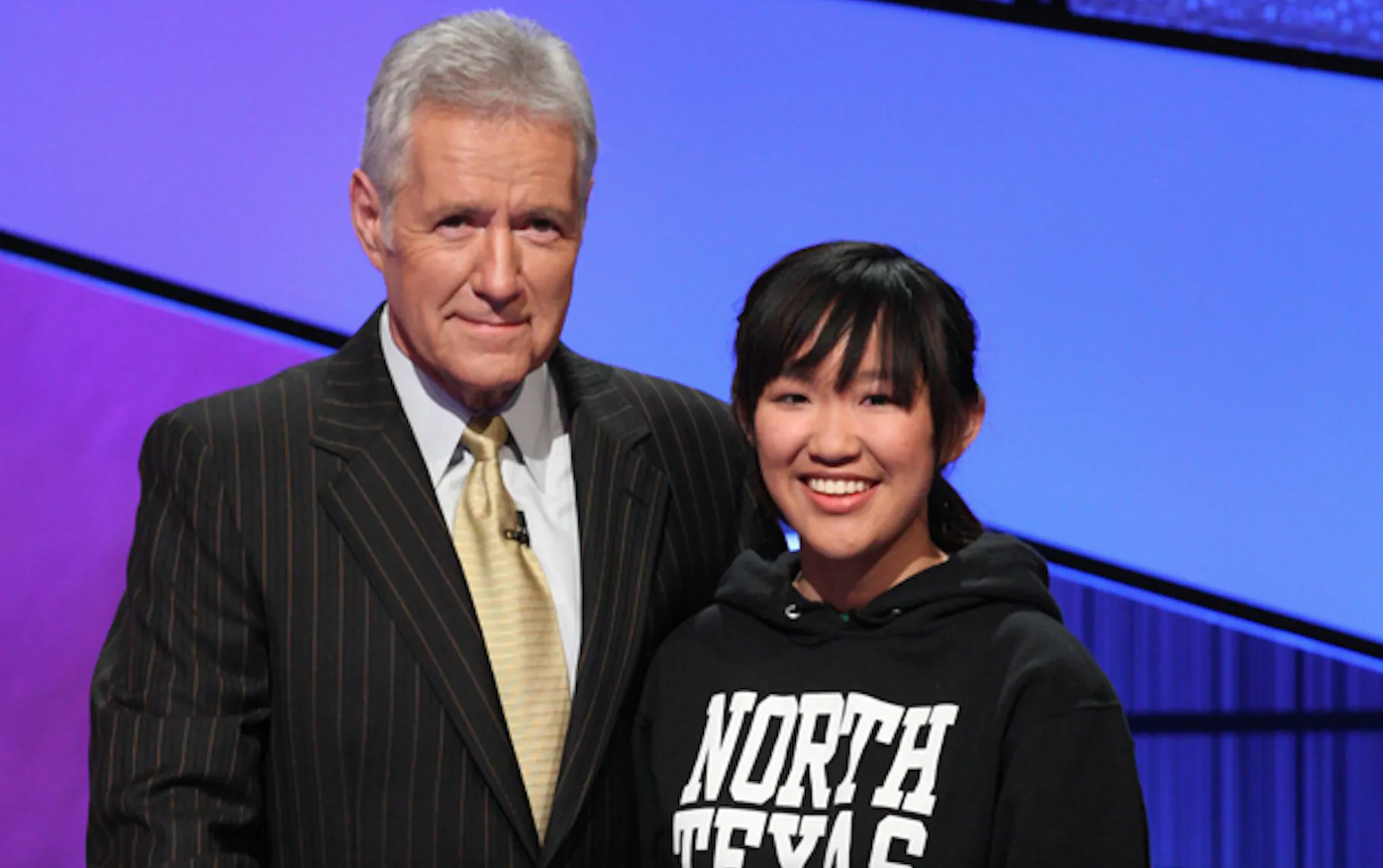
Monica Thieu with "Jeopardy!" host, the late Alex Trebek in 2012. (Jeopardy! Productions, Inc.)
Monica Thieu with "Jeopardy!" host, the late Alex Trebek in 2012. (Jeopardy! Productions, Inc.)
Her $100,000 winnings went toward tuition as she continued her undergraduate studies at Stanford University.
“I majored in psychology, not because of the trivia thing,” she says. “I just like science and trying to understand how people’s minds work.”
As a Stanford undergraduate, Thieu worked in Anthony Wagner’s cognitive neuroscience lab, which is focused on memory. “I used to joke with people in the lab that I should design a study on trivia experts so that I could convince Ken Jennings to come and get his brain scanned,” Thieu says.
Before becoming the host of “Jeopardy!” in 2023, Jennings rose to fame as the highest-earning American game show contestant — including $4,522,700 in winnings from “Jeopardy!”
In 2013, Thieu was invited to appear in the “Jeopardy!” Tournament of Champions but lost in the first round. “It was disappointing, but I still had a good time,” she recalls.
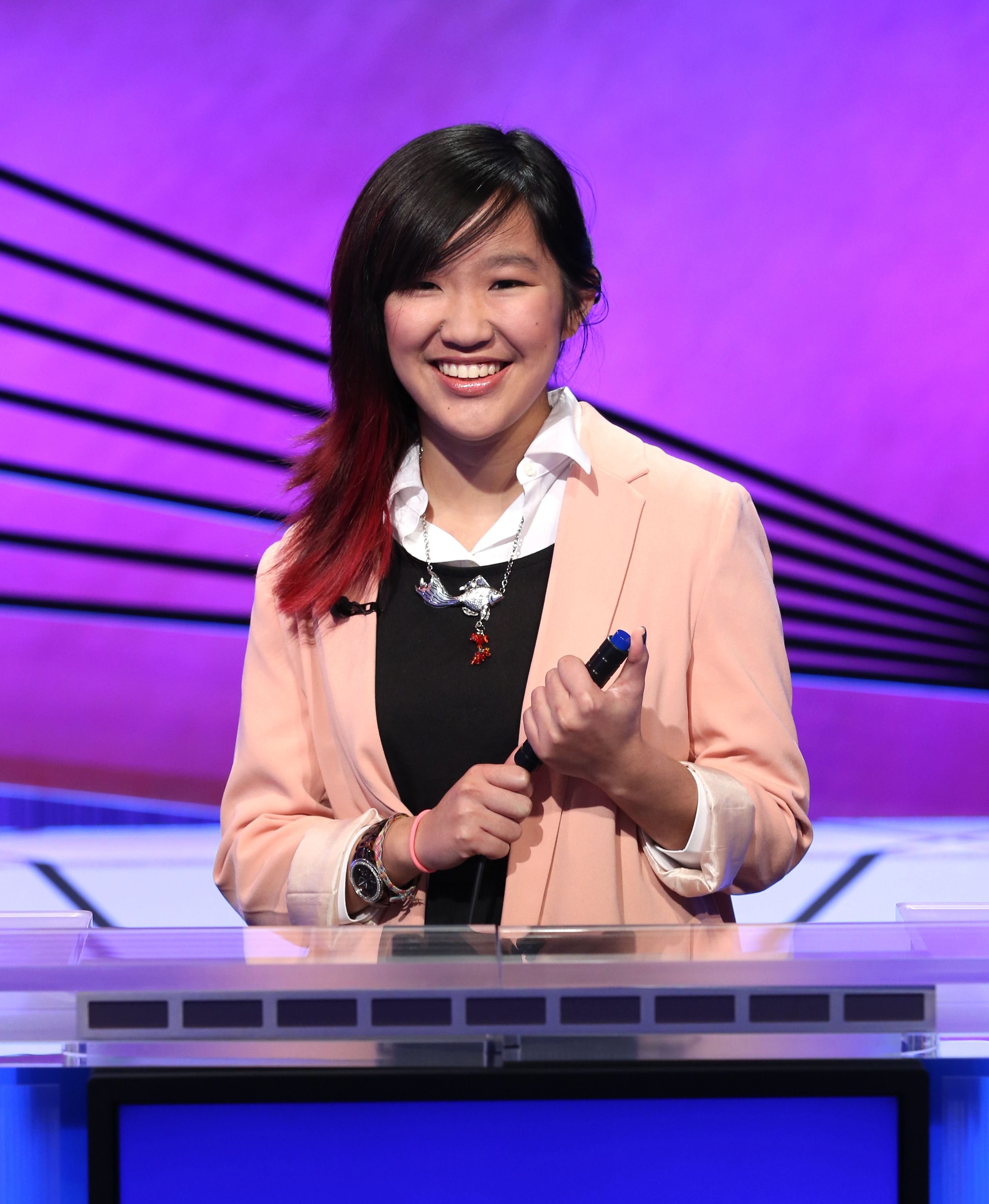
"Getting the timing on the buzzer just right is probably the hardest part for me," says Thieu, shown in 2013. "You're not allowed to ring in until the host stops talking or you get blocked for a quarter of a second." (Jeopardy! Productions, Inc.)
"Getting the timing on the buzzer just right is probably the hardest part for me," says Thieu, shown in 2013. "You're not allowed to ring in until the host stops talking or you get blocked for a quarter of a second." (Jeopardy! Productions, Inc.)
Thieu began working on her PhD at Columbia in 2017, investigating how people perceive and categorize social and emotional stimuli.
Although her research no longer focused on memory, Thieu was thrilled by an invitation in 2019 to appear alongside Jennings in the “Jeopardy!” All-Star Games, the show’s first-ever team-based tournament. Billed as the “Mount Rushmore of ‘Jeopardy!’” the 10-episode event featured 18 returning champions divided into six teams. Thieu was teamed with her idol Jennings and Matt Jackson, whose 13-episode winning streak also made him a “Jeopardy!” titan.
“I’m not someone who normally gets stage fright,” Thieu says, “but the ‘Jeopardy!’ nerves are very, very intense. As soon as the game starts, you have to pretend that you’re on your sofa and forget that it’s being filmed and that you’re playing for real money.”
One million dollars was at stake. Appearing with two “Jeopardy!” legends increased the pressure. “I just didn’t want to let Ken and Matt down,” Thieu recalls.
Team members worked together but appeared individually at different stages of the tournament — one in the first round, another in Double “Jeopardy!” and the other in the final round. The three strategized that Thieu should appear the final round since Jennings and Jackson were both faster on the buzzer and had long-winning track records.
In the end, the trio took second place, behind the team led by Brad Rutter, the second-highest-earning American game-show contestant of all time.
Thieu once again won $100,000, her share of the $300,000 second-place prize.
“Literally all of my retirement savings are from ‘Jeopardy!’ earnings because you don’t make a lot of money as a graduate student,” Thieu says.
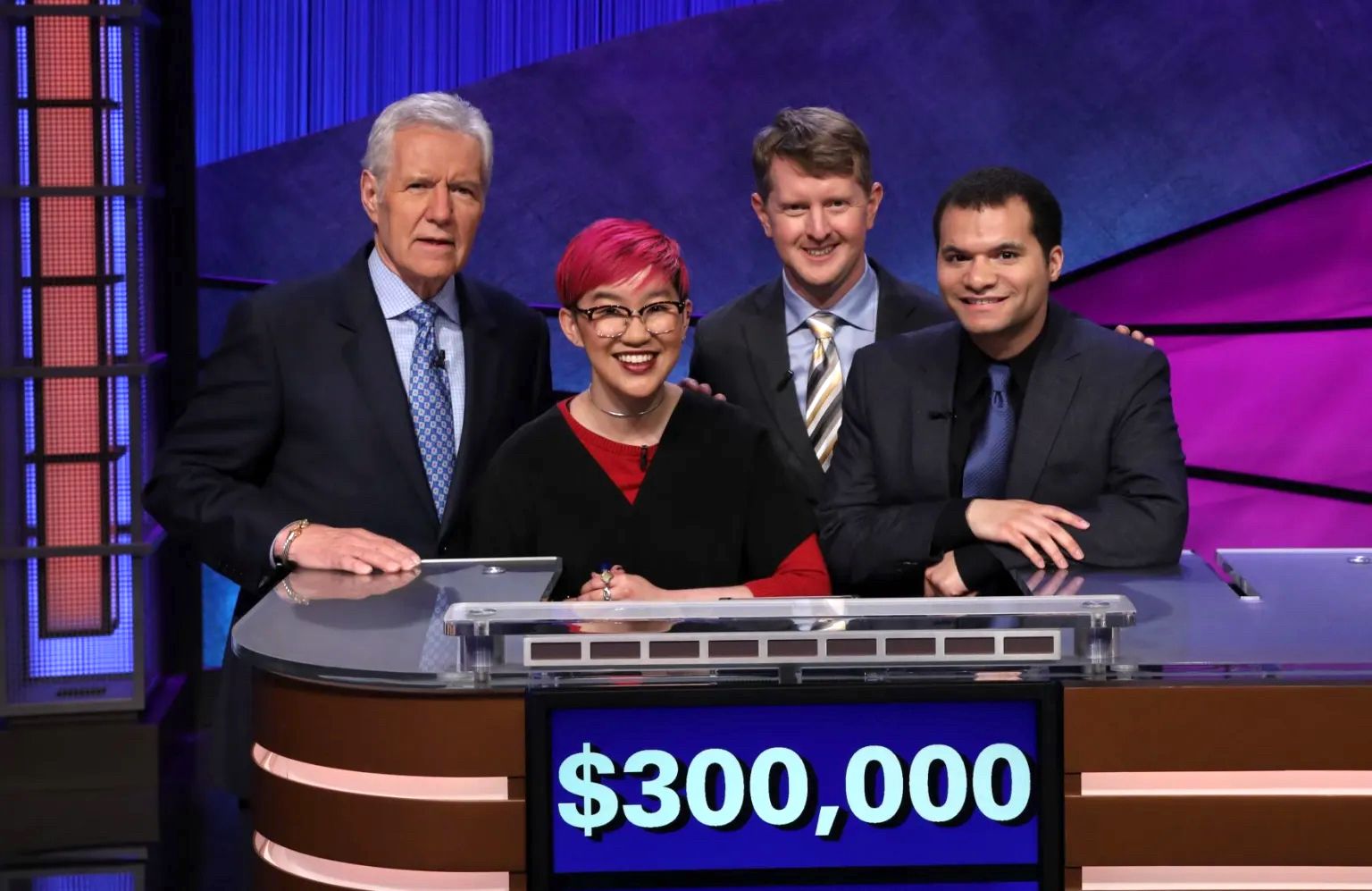
From left: Alex Trebek with Thieu and her teammates in the 2019 "Jeopardy!" All-Star Games, the legendary Ken Jennings and Matt Jackson. (Jeopardy! Productions, Inc.)
From left: Alex Trebek with Thieu and her teammates in the 2019 "Jeopardy!" All-Star Games, the legendary Ken Jennings and Matt Jackson. (Jeopardy! Productions, Inc.)
While working on her PhD dissertation on emotions, Thieu needed a distraction. She turned back to her idea of studying trivia experts.
“It was just something that I had been wanting to do,” she recalls. She talked it over with Mariam Aly, assistant professor of psychology at Columbia, and Lauren Wilkins, who was an undergraduate at Columbia and is now a research specialist at Princeton University.
“All of us shook hands and agreed, ‘Let’s do this because we think it would be fun,’” Thieu says. “It was very much a labor of love.”
Long-term memory can be divided into two categories. One category is episodic memory consisting of events or experiences full of details that can be brought up in the mind’s eye. The second category is semantic memory comprising facts, such as the names of different dog breeds or other facts that are not necessarily tied to an event where the information was learned.
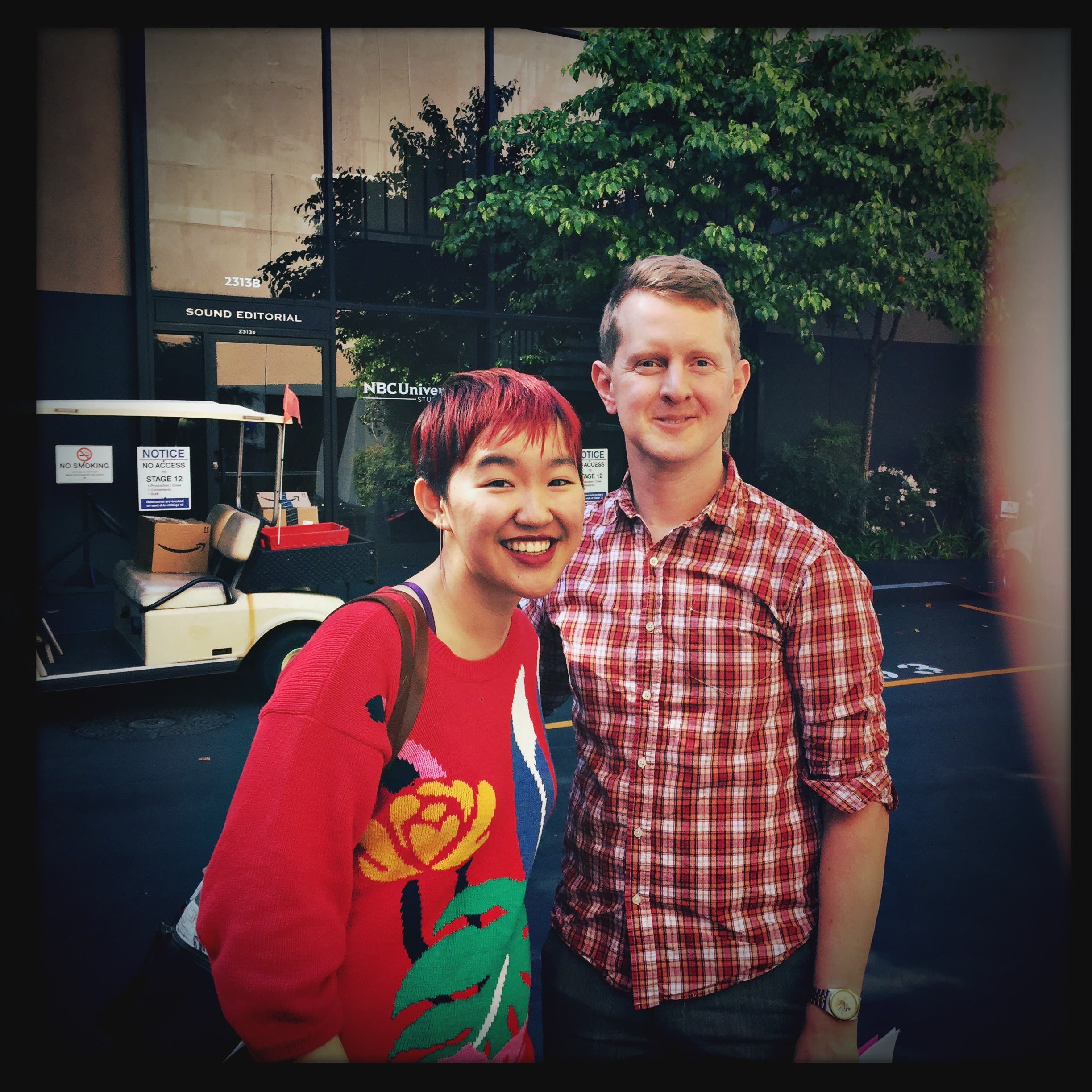
Thieu got input from other "Jeopardy!" contestants, including Ken Jennings, above, for her study. (Jeopardy! Productions, Inc.)
Thieu got input from other "Jeopardy!" contestants, including Ken Jennings, above, for her study. (Jeopardy! Productions, Inc.)
Classically, these two categories were considered largely separate because studies of brain-lesion patients during the 1950s showed that patients could have deficits in one category and not the other.
Later studies, however, showed some overlap between these two brain areas. It is established, for instance, that linking visualizations of familiar places to items on a list can improve the recall of those items. Use of this technique, sometimes referred to as creating a memory palace, goes as far back as the time of the ancient Greeks and Romans.
From Thieu’s own experiences, and from conversations she had with other “Jeopardy!” contestants, she knew that people adept at trivia games seem to have surprisingly rich episodic memories for when they learned trivia facts.
Jennings summed it up for Thieu: “I noticed on ‘Jeopardy!’ that I could often remember with great specificity when and where I had first learned a fact: in which high school or college class, in what movie scene, in which book or magazine from my elementary school library — even down to what part of the page, or maybe the room where I was reading it.”
Thieu and her colleagues wanted to scientifically test whether trivia experts were more likely to make these associations than those who were not as adept at trivia.
For an experimental setup, the researchers created two virtual online science and history museums, each decorated in different styles. The “Amber Archives,” for instance, were orange-themed and the “Cobalt Collection” was blue-themed.
“We wanted to give users as distinct and rich of a sensory experience as possible,” Thieu explains.
The museums were filled with exhibits of objects in six different categories: historical arms and armor; gemstone geology; musical instrument history; dinosaurs and other ancient fauna; automobile components; and food and cooking techniques. Each exhibit included photographs and placards written with multiple related facts about the objects.
“We needed to teach people new facts so we looked for things that didn’t often get asked about in trivia games,” Thieu says.
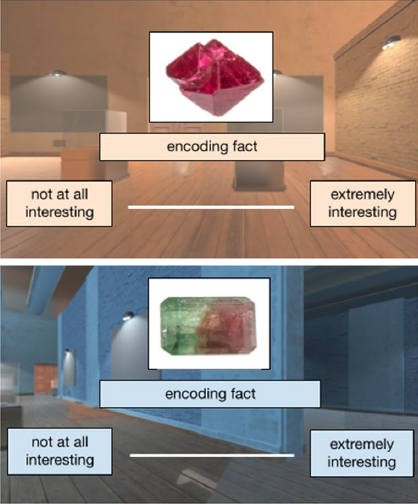
Participants used a sliding tool to rate their interest in the information they were presented in the virtual museums.
Participants used a sliding tool to rate their interest in the information they were presented in the virtual museums.
They recruited participants from the website LearnedLeague.com, where members play one another in trivia contests and are ranked based on the number of times they win. The 184 participants comprised a stratification of people from the higher to lower rankings. The participants also took a 50-question cued recall test of general knowledge, created by the researchers, to further measure their trivia expertise.
Participants were then individually presented visually with online museum exhibits, as a narrator read the text on the placards. The identity of the narrator varied between the two museums.
Afterward, participants completed recall tests about the information on each placard they had encountered. In a separate exercise, they indicated their confidence in which museum they had first encountered a placard. They also completed photo-recognition tests, requiring them to name the objects.
The results showed that those who ranked high in trivia expertise had better recall for the new facts they learned compared to those who ranked lower. The trivia experts did not, however, show generally better episodic memory than the nonexperts.
And in the trivia experts — but not the nonexperts — their memory for contextual details predicted greater fact recall.

Jennings and Thieu during the quarter-finals of the "Jeopardy!" Invitational Tournament. (Jeopardy! Productions, Inc.)
Jennings and Thieu during the quarter-finals of the "Jeopardy!" Invitational Tournament. (Jeopardy! Productions, Inc.)
After graduating from Columbia in 2022, Thieu came to Emory to work in the lab of Philip Kragel, an assistant professor of psychology, focused on the neural and computational underpinning of human cognition and emotion.
“I really enjoy teaching,” Thieu says. “I was attracted to the FIRST Postdoctoral Fellow program because it allocates some of my time for teaching so that I don’t get rusty.”
FIRST is an historic collaboration between Emory, Clark Atlanta University, Morehouse College, Morehouse School of Medicine and Spelman College. Launched in 2000, it is the largest and longest continuously running U.S. National Institutes of General Medical Sciences Institutional Research and Academic Career Development Awards program.
While she is back to her first research love of cognition and emotions, Thieu is proud of the trivia study.
“It involved the art of taking something that we humans intuitively feel and using the tools of science to break it down into something that we can systematically study,” she says.
Preparing for an appearance on "Jeopardy!" is not as cut and dried.
“It’s very hard to study for ‘Jeopardy!’” she says. “Either you get lucky with a category you know well, or you don’t.”
She advises would-be contestants to practice with questions from previous “Jeopardy!” shows compiled by fans on the website J-archive.com.
Story and design by Carol Clark.
Want to know more?
Please visit Emory News Center, and Emory University.

